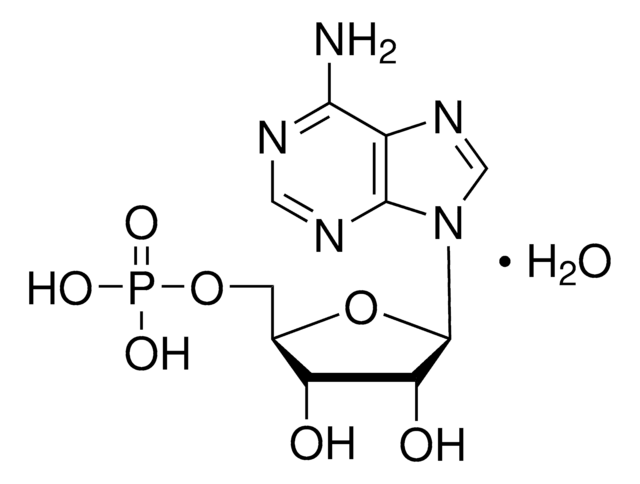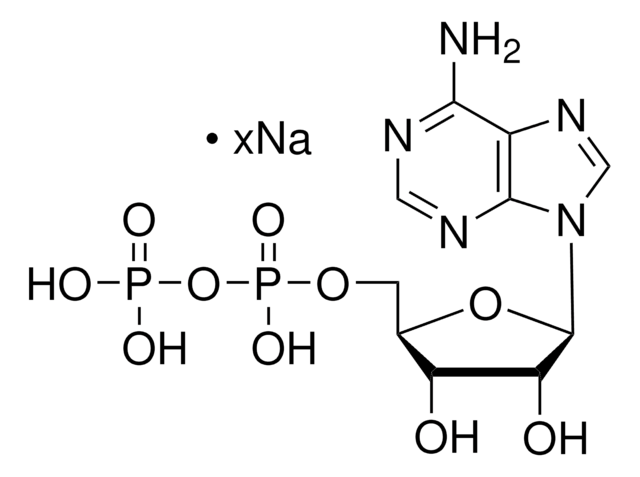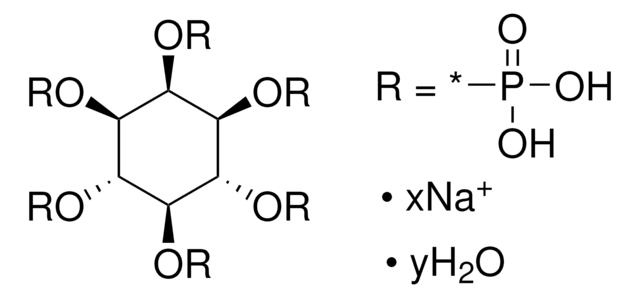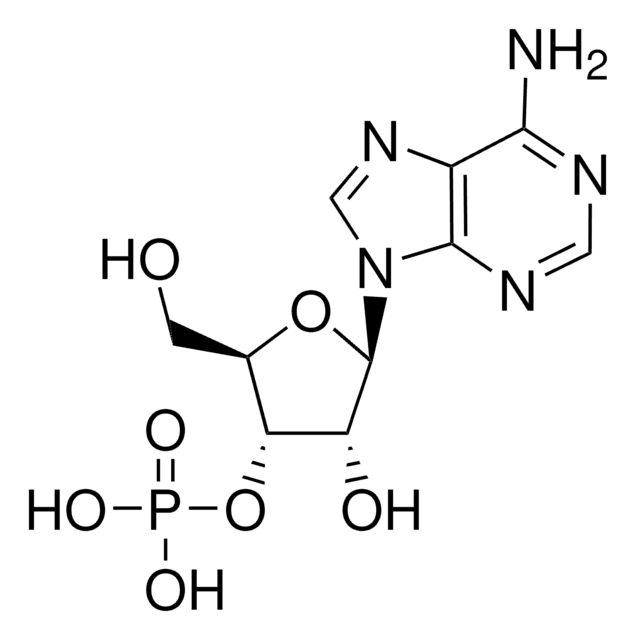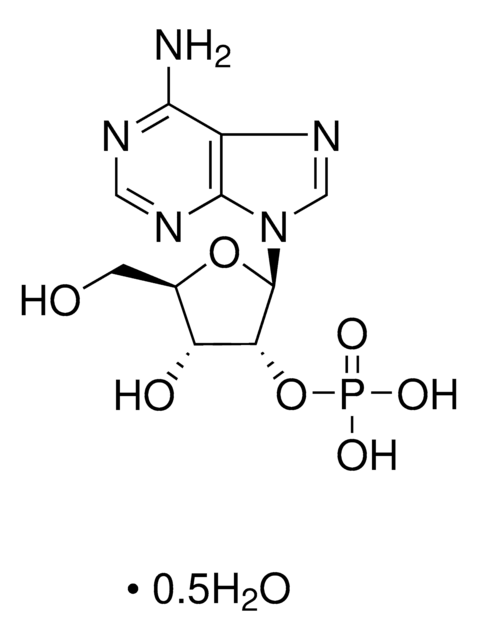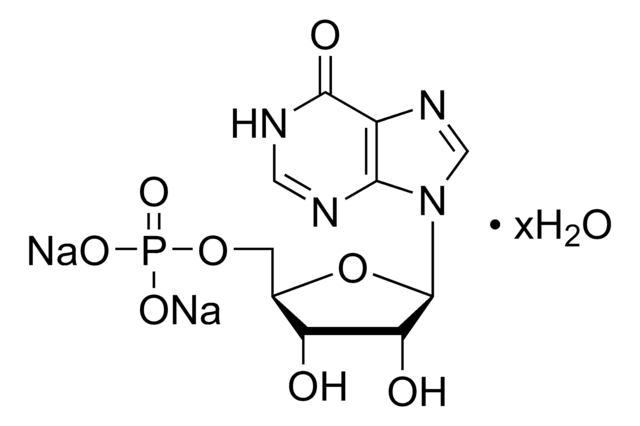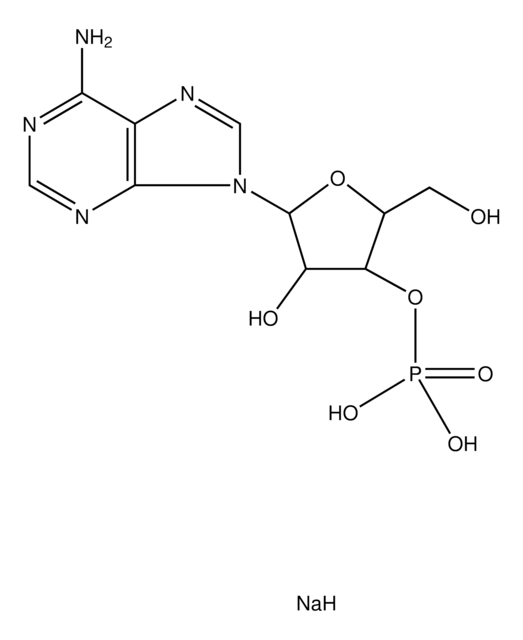A1752
Adenosine 5′-monophosphate sodium salt
from yeast, ≥99%
Synonym(s):
5′-Adenylic acid, A-5′-P, AMP
Sign Into View Organizational & Contract Pricing
All Photos(5)
About This Item
Empirical Formula (Hill Notation):
C10H14N5O7P · xNa+ · yH2O
CAS Number:
Molecular Weight:
347.22 (anhydrous free acid basis)
UNSPSC Code:
41106305
eCl@ss:
32160414
PubChem Substance ID:
NACRES:
NA.51
Recommended Products
biological source
yeast
Quality Level
Assay
≥99%
form
powder
solubility
H2O: soluble
storage temp.
−20°C
SMILES string
NC1=NC=NC2=C1N=CN2[C@H]3[C@H](O)[C@H](O)[C@]((COP(O)(O)=O)([H])O3.C.
Looking for similar products? Visit Product Comparison Guide
Application
Adenosine 5′-monophosphate sodium salt has been used:
- as a component of reactivation medium to reactivate mouse sperm extracted from caudae epididymides for sperm motility studies
- as a substrate in signal amplification by reversible exchange (SABRE) method to develop biocompatible SABRE hyperpolarization
- as a substrate in wheat and Aspergillus niger phytase, assay
- in luciferase assay to monitor intracellular α-synuclein oligomerization in S1S2 cells
- to study its effects on induction of therapeutic hypothermia and neuronal damage in a rat model of cardiac arrest (CA) and resuscitation
Biochem/physiol Actions
Adenosine 5′-monophosphate (5′-AMP) is used to enhance flavor in meat and poultry soups. It is also used as a food additive for specific nutritional purposes. 5′-AMP is an activator of a class of protein kinases known as AMP-activated protein kinase (AMPK). Along with inosine monophosphate (IMP), AMP mediates the dissociation of skeletal muscle actomyosin to actin and myosin. Therefore, these two factors may be involved in causing the resolution of rigor mortis in muscles.
Storage Class Code
11 - Combustible Solids
WGK
WGK 3
Flash Point(F)
Not applicable
Flash Point(C)
Not applicable
Personal Protective Equipment
dust mask type N95 (US), Eyeshields, Gloves
Choose from one of the most recent versions:
Certificates of Analysis (COA)
Lot/Batch Number
Don't see the Right Version?
If you require a particular version, you can look up a specific certificate by the Lot or Batch number.
Already Own This Product?
Find documentation for the products that you have recently purchased in the Document Library.
Customers Also Viewed
Yugo Tsuchiya et al.
Bioscience reports, 32(2), 197-213 (2011-08-20)
In adult rat cardiac myocytes adrenaline decreased AMPK (AMP-activated protein kinase) activity with a half-time of approximately 4 min, decreased phosphorylation of AMPK (α-Thr172) and decreased phosphorylation of ACC (acetyl-CoA carboxylase). Inactivation of AMPK by adrenaline was through both α1- and
Alexey S Kiryutin et al.
Magnetic resonance in chemistry : MRC (2021-06-05)
Signal amplification by reversible exchange (SABRE) is a popular method for generating strong signal enhancements in nuclear magnetic resonance (NMR). In SABRE experiments, the source of polarization is provided by the nonthermal spin order of parahydrogen (pH2 , the H2
Mikkel G Terp et al.
Molecular oncology, 15(12), 3299-3316 (2021-06-25)
RAS-MAPK signaling promotes immune evasion and cancer cell survival, and MAPK inhibitors (MAPKis) are frequently used as cancer therapies. Despite progress elucidating the direct effects of MAPKi on immune cells, their indirect effect on the tumor microenvironment (TME) through changes
Giorgia Zadra et al.
Clinical cancer research : an official journal of the American Association for Cancer Research, 16(13), 3322-3328 (2010-04-29)
Although the role of metabolic syndrome (MS) and a high fat diet in prostate cancer (PCa) risk is still a matter of intense debate, it is becoming increasingly clear that obesity can cause perturbations in metabolic pathways that contribute to
Makhosazane Zungu et al.
The American journal of pathology, 178(1), 4-11 (2011-01-13)
The 5'-AMP-activated protein kinase (AMPK) functions as a metabolic fuel gauge that is activated in response to environmental stressors to restore cellular energy balance. In the heart, AMPK coordinates the activation of glucose and fatty acid metabolic pathways to ensure
Protocols
Enzymatic Assay of 5’-Nucleotidase
Our team of scientists has experience in all areas of research including Life Science, Material Science, Chemical Synthesis, Chromatography, Analytical and many others.
Contact Technical Service
